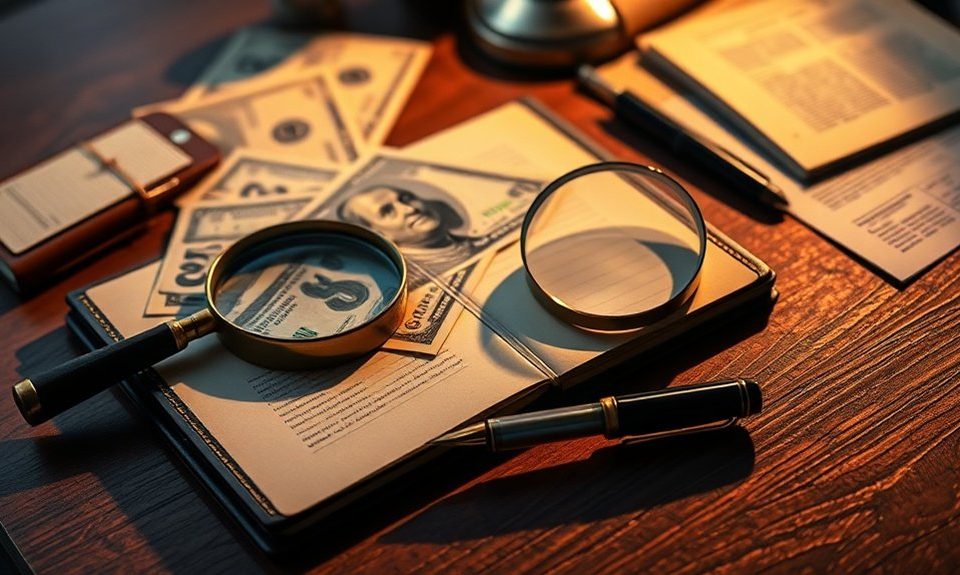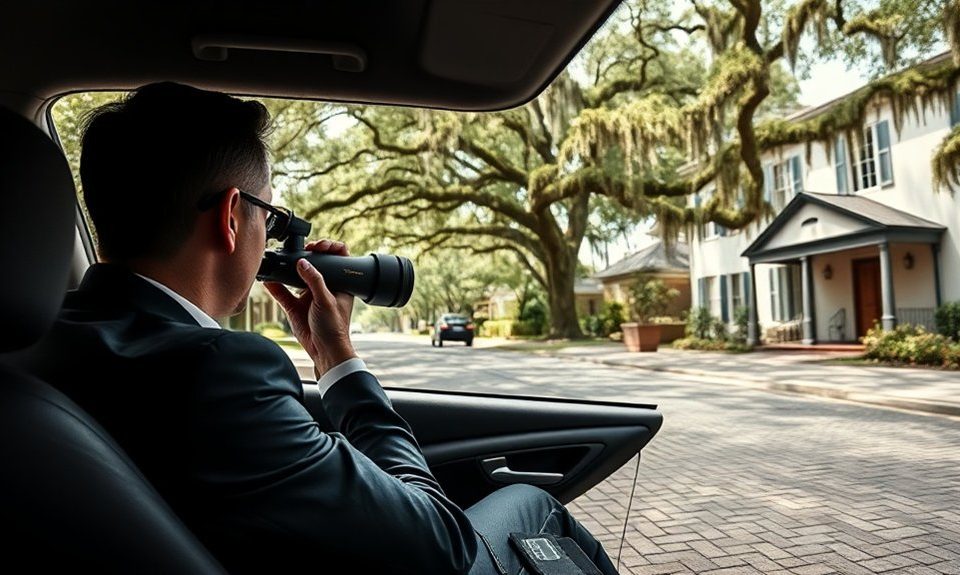Private investigators play a vital role in revealing information and collecting evidence for diverse purposes. It is imperative for them to comprehend the legal parameters that regulate their operations, encompassing surveillance activities and information retrieval.
This discourse will explore the regulations and limitations concerning the utilization of technology, engagements with subjects and clients, and the legal constraints in evidence acquisition. It is crucial to remain abreast of the rights and obligations associated with the profession of private investigators.
Key Takeaways:
.jpg_00.jpg)
- Private investigators have legal limitations on their actions, including restrictions on surveillance and information gathering.
- Clients have the right to know the methods used by a private investigator and how their information will be used.
- Evidence collected by a private investigator must be admissible in court and comply with privacy laws and data protection regulations.
Understanding the Role of Private Investigators
Private investigators fulfill a crucial function across multiple sectors, providing valuable support to law firms in handling intricate cases, aiding insurance companies in identifying instances of fraud, and conducting comprehensive background checks and security evaluations to locate missing individuals. Their proficiency is frequently solicited by organizations and businesses, rendering them critical assets in a variety of investigative contexts.
What Private Investigators Can Legally Do
Private investigators have the legal authority to access public records and conduct surveillance within the bounds of state laws and ethical standards. It is imperative that they ensure they have proper consent and operate within the confines of the law.
Private investigators leverage a variety of investigative methods, including background checks, interviews, and undercover operations, to gather essential information for their clients. Their adeptness at meticulously analyzing data allows them to uncover hidden details by connecting disparate pieces of information. They possess the expertise required to conduct in-depth research on individuals or entities, which may involve scrutinizing financial records, social media activity, and past legal proceedings. These professionals must maintain the utmost discretion and confidentiality, upholding the highest standards of professionalism in all facets of their work.
What Private Investigators Cannot Do
Private investigators are strictly prohibited from participating in illicit activities such as wiretapping, hacking electronic devices, intruding on private property, or assuming the role of law enforcement personnel without lawful authorization. These legal parameters and constraints are established to safeguard the privacy and rights of individuals. Wiretapping entails intercepting communication without proper consent, while hacking compromises electronic security systems. Unauthorized trespassing on private property constitutes a breach of property rights, and impersonation of law enforcement officials can result in confusion and potential harm. Consequently, private investigators must consistently ensure compliance with legal regulations to preserve their integrity and adhere to ethical norms.
Surveillance and Monitoring Activities
The surveillance and monitoring undertakings conducted by private investigators exhibit considerable variation contingent upon the setting, with distinct legal and ethical implications for public areas as opposed to private premises. These professionals frequently employ GPS tracking, scrutinize phone records, and assess social media engagement within the confines of legal authorization.
Monitoring Activities in Public Spaces
.jpg_01.jpg)
Surveillance activities conducted by private investigators in public spaces are typically permissible, provided that they do not violate individuals’ expectation of privacy and are carried out with proper legal consent.
Private investigators commonly employ tools such as GPS tracking to gather information and monitor the movements of individuals within the boundaries of the law. While surveillance can serve as a valuable investigatory instrument, it is crucial to strike a balance between conducting thorough inquiries and respecting the privacy rights of individuals.
Investigators must strictly adhere to legal mandates and ensure that their surveillance activities do not overstep the bounds of legality or ethical conduct. A thorough comprehension of the parameters and constraints governing surveillance in public spaces is imperative for investigators to operate lawfully and uphold the integrity of the investigative process.
Surveillance Restrictions in Private Properties
Surveillance on private properties is subject to rigorous legal limitations, necessitating private investigators to secure explicit consent and abstain from trespassing or deploying unauthorized GPS trackers.
Engaging in surveillance on private properties without proper authorization carries the risk of severe legal repercussions, including litigation and criminal allegations. It is imperative for individuals conducting surveillance activities to adhere to the regulations outlined by laws and ethical norms to safeguard the privacy of individuals and prevent infringements on their rights.
In situations where obtaining consent proves unfeasible, investigators must explore alternative approaches that do not entail encroaching upon the privacy of individuals or violating property boundaries.
Use of Technology and Information Gathering
Private investigators employ a diverse range of technological tools and methodologies to gather information, ensuring that all operations are conducted in accordance with legal regulations and with requisite consent. These methods encompass accessing databases, surveilling social media platforms, and utilizing electronic devices such as GPS trackers.
Legal Methods for Gathering Information
Private investigators rely on lawful methods to gather information, such as accessing public records, databases, social media, and internet sources with appropriate authorization. They frequently employ open-source intelligence techniques, which entail scrutinizing publicly available information to assemble essential details for a case. In addition, private investigators may engage in interviews with pertinent individuals and scrutinize physical evidence to unveil crucial facts.
These professionals possess the necessary expertise to locate individuals, discreetly monitor activities, and conduct surveillance within legal limits. By obtaining consent and adhering to stringent legal procedures, private investigators can access a range of records and databases, including but not limited to court records, property records, and financial records.
Restrictions on Wiretapping and Electronic Surveillance
Wiretapping and electronic surveillance are subject to stringent regulations that mandate private investigators to obtain legal consent and refrain from engaging in illegal activities, such as hacking into phone records or other electronic devices.
These legal constraints are established to safeguard individual privacy rights and prevent unauthorized intrusions into personal information. Prior consent from all parties must be secured before conducting any wiretapping or electronic surveillance. Non-compliance with these regulations can result in serious legal repercussions, including criminal charges and civil penalties. It is imperative for private investigators to operate within the confines of the law to preserve the integrity of their investigations and uphold ethical standards in their professional conduct.
Interactions with Subjects and Clients
.jpg_10.jpg)
The interactions among private investigators, their subjects, and clients must adhere to stringent ethical practices, legal guidelines, and consent protocols. Whether conducting interviews or working in partnership with associates and law enforcement officers, upholding professionalism and integrity is of utmost importance.
Rules on Deceptive Practices
Private investigators are required to refrain from engaging in deceptive practices, such as assuming false identities in order to acquire information, and must ensure that all actions taken adhere to ethical standards and legal consent.
Adherence to ethical guidelines is of utmost importance in the field of private investigations, as it serves to maintain the integrity of the profession and establish trust with clients. Securing consent from all parties involved not only serves as a safeguard against potential legal ramifications but also demonstrates respect for the privacy and autonomy of individuals. Unauthorized impersonation can carry significant consequences, including legal action and the potential loss of professional licensure. By strictly following these guidelines, private investigators can conduct their work ethically and uphold the highest standards of professionalism.
Disclosure of Information to Clients
The disclosure of information to clients necessitates meticulous handling to ensure that all sensitive data is shared in compliance with legal consent and ethical standards.
When professionals disclose information to clients, they are required to follow stringent protocols to safeguard the confidentiality of sensitive data. Obtaining informed consent from clients before divulging any information is essential, as it ensures that they are fully informed about the nature and scope of the disclosure. Ethical considerations, in addition to legal obligations, are crucial for maintaining trust and transparency in client relationships. Professionals must exercise responsible handling of sensitive information, taking into consideration the potential impact on clients and recognizing the significance of privacy and confidentiality in the therapeutic process.
Legal Boundaries in Evidence Collection
Private investigators must adhere to stringent legal boundaries when collecting evidence. It is imperative that all evidence is obtained with proper consent and in accordance with privacy laws and data protection regulations. This approach guarantees the admissibility of the evidence in court and ensures compliance with legal standards.
Admissibility of Evidence in Court
In order for evidence to be deemed admissible in a court of law, private investigators are required to obtain it legally and with appropriate consent. This often involves close collaboration with law enforcement agencies to validate the evidence’s authenticity.
The partnership with law enforcement entities plays a critical role in ensuring that evidence is procured in accordance with the established legal procedures outlined by the judicial system. These procedures typically entail securing search warrants, conducting lawful surveillance activities, and meticulously documenting the chain of custody to demonstrate that the evidence has remained untampered with or unaltered. By adhering to these prescribed protocols, private investigators contribute to safeguarding the integrity of the evidence gathered, thereby facilitating its acceptance in legal proceedings and bolstering the prosecution’s case.
Privacy Laws and Data Protection
.jpg_11.jpg)
Privacy laws and data protection regulations play a vital role in governing the operations of private investigators, ensuring that all personal and sensitive data is managed in a lawful and consensual manner.
These laws function as a protective mechanism for individuals’ privacy rights, imposing constraints on how private investigators acquire, utilize, and disclose data obtained during their investigative processes. It is imperative for investigators to adhere strictly to legal mandates, including procuring consent prior to the collection of any personal information and guaranteeing that data is stored securely and exclusively accessed by authorized personnel. By adhering to these regulations, private investigators not only safeguard individuals’ privacy but also uphold their professional integrity and credibility.
Frequently Asked Questions
What exactly can a private investigator do and not do?
A private investigator can perform surveillance, conduct background checks, and gather evidence for legal cases. They cannot make arrests or obtain warrants.
Can a private investigator tap phone lines or hack into email accounts?
No, this is illegal and violates privacy laws. Private investigators must adhere to legal methods of obtaining information.
Do private investigators have access to government databases?
Yes, but only for specific purposes and with proper authorization. They cannot use this access for personal gain or without a valid reason.
Can a private investigator break into someone’s home or car?
No, this is considered trespassing and is illegal. Private investigators must also obtain permission before entering private property.
Are there any restrictions on who can hire a private investigator?
No, anyone can hire a private investigator for legitimate reasons. However, certain laws and regulations must be followed during the investigation process.
Can a private investigator provide false information or misrepresent themselves?
No, this is against the law and can result in serious penalties. Private investigators must be transparent and truthful in their actions and interactions.
OUR LOCATIONS
Private Investigator Columbia SC
Stillinger Investigations, Inc.
1416 Park Street
Columbia, SC 29201
(803) 400-1974
https://investigatesc.com/
https://www.google.com/maps?cid=5784885512772067774
Private Investigator Rock Hill SC
Stillinger Investigations, Inc.
331 East Main Street Suite 200
Rock Hill, SC 29730
(803) 232-7301
https://investigatesc.com/private-investigator-rock-hill-SC/
https://www.google.com/maps?cid=3999577317773326056
Private Investigator Lexington SC
Stillinger Investigations, Inc.
203 West Main Street Suite G6
Lexington, SC 29072
(803) 699-3350
https://investigateSC.com/private-investigator-lexington-SC/
https://www.google.com/maps?cid=12400535685489784328
Private Investigator Myrtle Beach SC
Stillinger Investigations, Inc.
1203 48th Ave N Ste 201
Myrtle Beach, SC 29577
(843) 492-2999
https://investigateSC.com/private-investigator-myrtle-beach-SC/
https://www.google.com/maps?cid=13386067594840879881
Private Investigator Charleston SC
Stillinger Investigations, Inc.
170 Meeting Street
Charleston, SC 29401
(843) 212-1338
https://investigatesc.com/private-investigator-charleston-sc/
https://www.google.com/maps?cid=10261181566017651201
Stillinger Investigations is the Best Private Investigator in Columbia SC! Brian Stillinger is the owner of one of the most prominent private investigation companies in South Carolina.
At Stillinger Investigations, we have 125+ years of combined investigative experience and a diverse team with a wide range of backgrounds and qualifications.
We are a private investigation team focusing on adultery, child custody, insurance fraud, civil litigation and criminal defense investigations. With 12 full-time, licensed investigators, we provide prompt, thorough, dependable service to attorneys, insurance companies and individual clients throughout the Southeast US. We maintain a full range of technical and surveillance equipment, including specialize
Private Investigator in Columbia SC
Private Investigator in Charleston SC
Private Investigator Myrtle Beach
Private Investigator in Rock Hill
Private Investigator in Lexington SC






